Responding to climate change
- JAC TOP
- Sustainability
- Responding to climate change


To build a sustainable future, it is essential to address climate change, starting with the reduction of greenhouse gases (GHG). Doing so will make it possible to protect the lobal environment, maintain a balance between ecosystems, and provide a better environment for future generations. In terms of how these issues affect JAC Group, as temperatures rise and the severity of natural disaster worsens, the potential impacts on JAC Group's operations and performance, including shifts in the corporate recruitment business and cost structures, become increasingly significant.
To address this, the Group takes climate change risk seriously and is committed to promoting sustainable business operations. Following the recommendations by the Task Force on Climate-related Financial Disclosures (TCFD), we are establishing a governance framework, identifying and evaluating risks and opportunities to enable strategic planning, managing risks, and setting metrics and targets.

Governance
We have established a governance framework that defines management’s role in assessing and managing climate change risks and opportunities, as shown in the figure below.
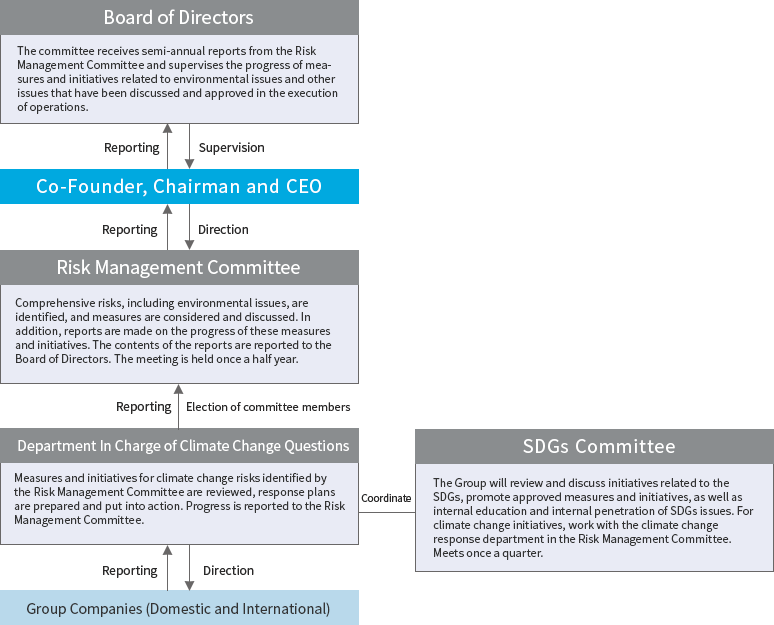
Strategy
JAC Group identifies and assesses risks and opportunities in relation to our business based on the 1.5° C and 4° C scenarios published by external organisations such as the International Energy Agency (IEA) and the Intergovernmental Panel on Climate Change (IPCC).
Referenced scenarios
-
1.5℃ scenario
- IEA 「NZE(Net Zero Emission by 2050)」
- IPCC 「RCP 2.6」
-
4℃ scenario
- IEA 「STEPS(Stated Policies Scenario)」
- IPCC 「RCP 8.5」
IEA: International Energy Agency
IPCC: Intergovernmental Panel on Climate Change
RCP: Representative Concentration Pathways
Risks and Opportunities
The key opportunities and risks, as well as the timescales and financial implications that we have identified and analysed based on the above scenarios, are as follows:
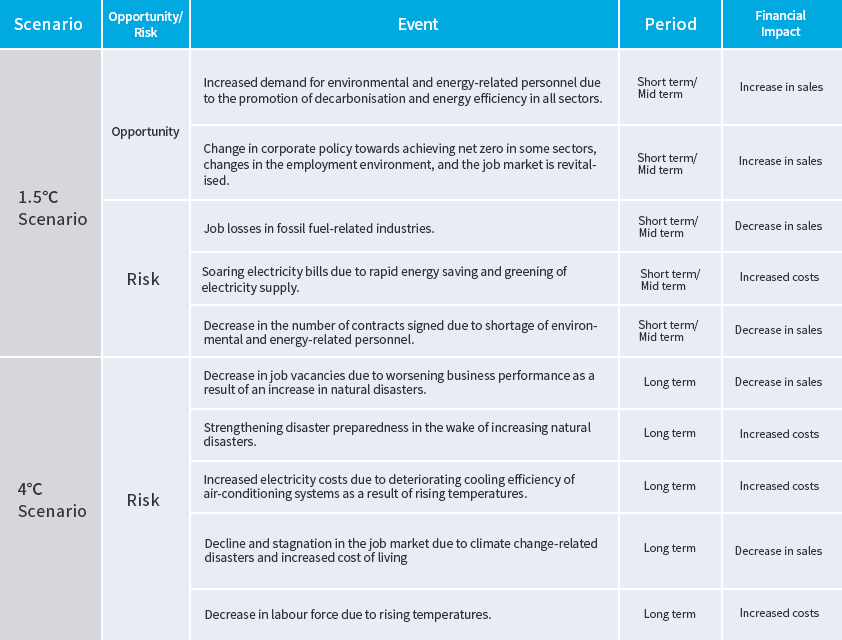
Concrete Strategy
In an effort to reduce CO2 emissions, JAC Group has continued forestation activities in South East Asia since 2008. As a global recruitment company, we contribute to environmental protection on a global scale. This initiative is a part of our efforts to respond to the Sustainable Development Goals (SDGs), which aim to contribute to individuals, communities, and society as a whole. We will continue to restore forests through this activity as a company-wide project to contribute to the conservation and protection of precious flora and fauna and to the reduction of global CO2 emissions.Our approach to risks and opportunities are also as follows.
Initiatives Against Risks
Diversification of customer portfolios: addressing the risk of declining sales
As the impact of climate change is expected to vary by industry, we diversify our clients across a variety of industries to minimise impacts on our business.
Promoting energy conservation activities: responding to cost increases
We will respond to the risk of electricity rate hikes occurring due to climate change by strengthening energy conservation activities.
Initiatives for Opportunities
Strengthening of sustainability-related recruitment
There is an increasing focus on initiatives concerning responses to climate change at various companies, leading to a rise in demand for mid-career professionals skilled in environmental and SDGs-related areas. We will seize this opportunity to expand our business by finding and securing human resources with these skills, and contribute to the acceleration of decarbonisation efforts in society as a whole.
Risk Management
In an increasingly complex and uncertain business environment, it is essential to effectively address risks that can have a significant impact on business operations in executing management strategy and achieving business objectives. We consider risk management a vital initiative for enhancing corporate value and have established the Risk Management Committee chaired by the Co-Founder, Executive Director, Chairman & CEO. The Committee is in charge of identifying and addressing various risks we could face.
Climate change risk is also recognised as one of the risks that can have a profound impact on JAC Group’s operations. Within this framework, we narrow down and monitor key risks, continually reassessing their implications and potential consequences.
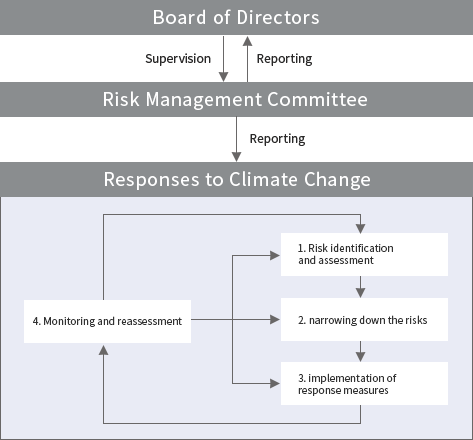
Targets and Metrics
The Group has set a target to achieve carbon neutrality by FY2030 as our greenhouse gas emission reduction goal, encompassing Scope 1 to 3 emissions. We are committed to reducing GHG emissions in our business activities, procuring green electricity, and expanding GHG absorption through forestation efforts. In addition, by placing personnel who foster innovation, we aim to drive the transition to carbon neutrality across society.
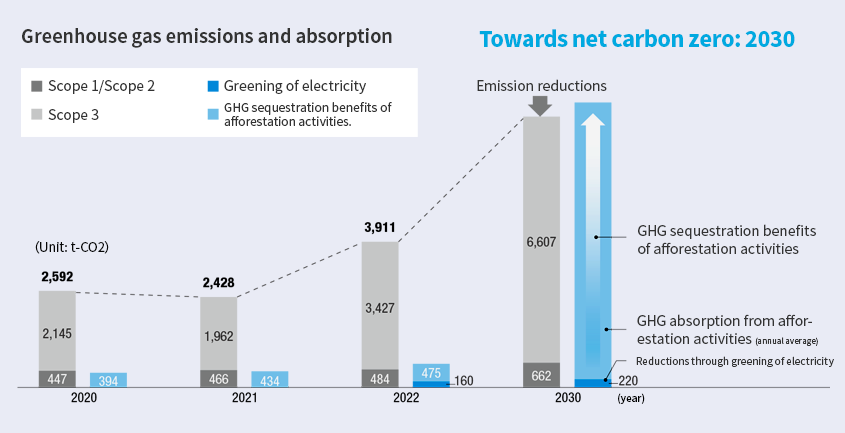
GHG Emission Status
The Group has been calculating GHG emissions at all domestic and international locations, including subsidiaries, since FY2020. In addition, starting in FY2023, both location-based and market-based criteria are calculated for Scope 2.
In FY2024, GHG emissions (Scope 1 + 2 + 3; market basis) were 2,948 t-CO2e, up 4.5% from the last year, due to the expansion of business activities.
JAC Group has also obtained third-party verification from SOCOTEC Certification Japan Co., Ltd. for three consecutive years starting in FY2021.
Independent Assurance Report (2024)(1,106KB PDF)
Greenhouse Gas (GHG) Emissions Details
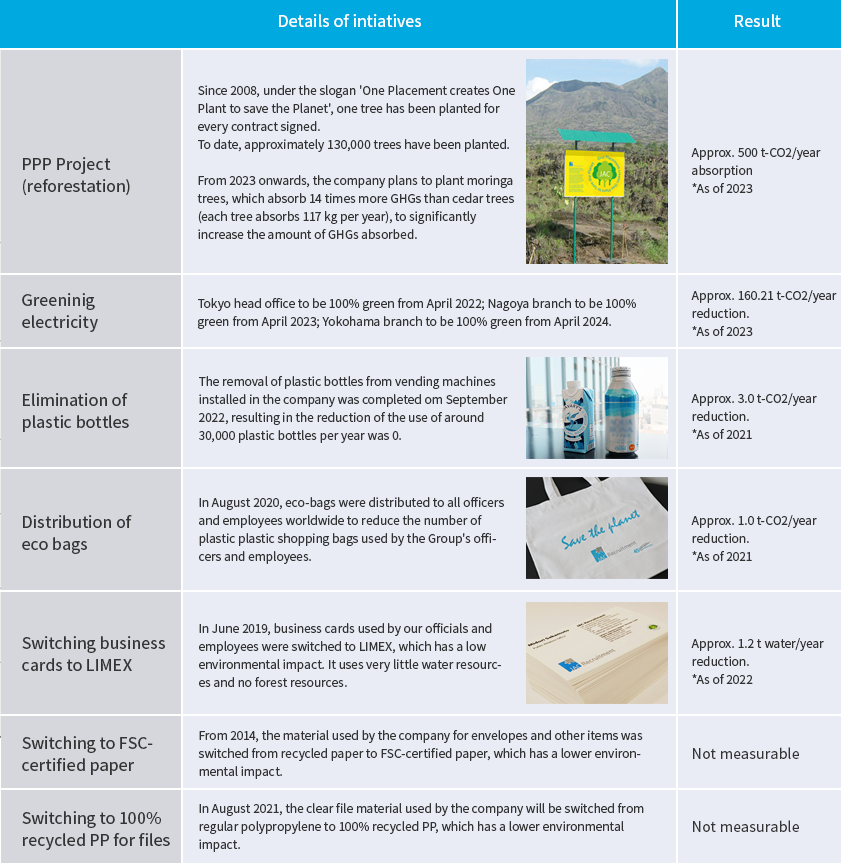
Initiatives for GHG Reduction and Absorption

Sustainability
- My thoughts on SDGs, JAC Group Founder
- SDGs related initiatives
Value Creation Stories
Environment
Social
Governance
Participation in Initiatives and External Evaluation
- ESG data